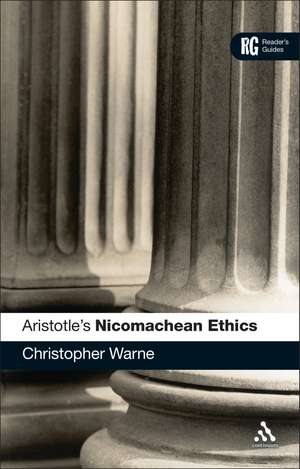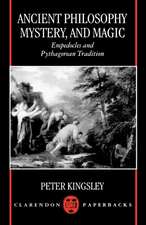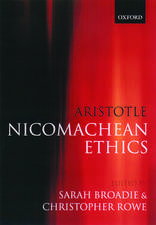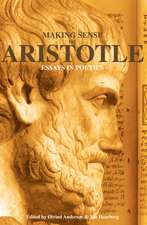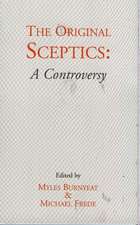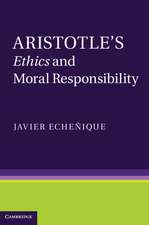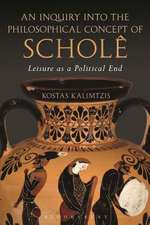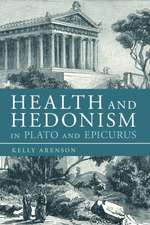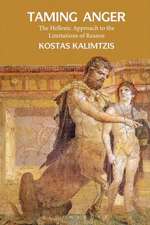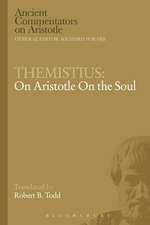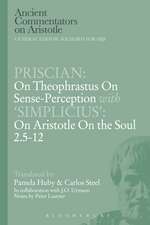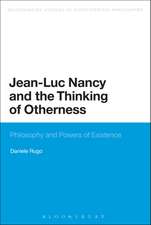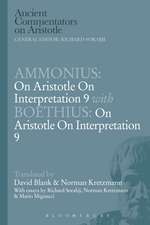Aristotle's 'Nicomachean Ethics': A Reader's Guide: Reader's Guides
Autor Christopher Warneen Limba Engleză Paperback – 9 oct 2006
| Toate formatele și edițiile | Preț | Express |
|---|---|---|
| Paperback (1) | 176.61 lei 6-8 săpt. | |
| Bloomsbury Publishing – 9 oct 2006 | 176.61 lei 6-8 săpt. | |
| Hardback (1) | 770.13 lei 6-8 săpt. | |
| Bloomsbury Publishing – 9 oct 2006 | 770.13 lei 6-8 săpt. |
Din seria Reader's Guides
-
 Preț: 132.80 lei
Preț: 132.80 lei - 5%
 Preț: 164.90 lei
Preț: 164.90 lei -
 Preț: 157.75 lei
Preț: 157.75 lei - 22%
 Preț: 566.78 lei
Preț: 566.78 lei - 19%
 Preț: 496.21 lei
Preț: 496.21 lei - 14%
 Preț: 143.87 lei
Preț: 143.87 lei - 9%
 Preț: 143.41 lei
Preț: 143.41 lei -
 Preț: 147.76 lei
Preț: 147.76 lei - 9%
 Preț: 157.32 lei
Preț: 157.32 lei - 14%
 Preț: 164.13 lei
Preț: 164.13 lei - 14%
 Preț: 165.20 lei
Preț: 165.20 lei - 14%
 Preț: 162.79 lei
Preț: 162.79 lei - 9%
 Preț: 143.87 lei
Preț: 143.87 lei - 8%
 Preț: 158.82 lei
Preț: 158.82 lei - 8%
 Preț: 151.03 lei
Preț: 151.03 lei - 14%
 Preț: 596.23 lei
Preț: 596.23 lei -
 Preț: 164.35 lei
Preț: 164.35 lei -
 Preț: 146.75 lei
Preț: 146.75 lei - 26%
 Preț: 494.94 lei
Preț: 494.94 lei - 8%
 Preț: 158.20 lei
Preț: 158.20 lei - 9%
 Preț: 144.12 lei
Preț: 144.12 lei - 14%
 Preț: 143.66 lei
Preț: 143.66 lei - 14%
 Preț: 176.61 lei
Preț: 176.61 lei -
 Preț: 144.04 lei
Preț: 144.04 lei - 9%
 Preț: 150.33 lei
Preț: 150.33 lei - 14%
 Preț: 143.78 lei
Preț: 143.78 lei - 9%
 Preț: 150.77 lei
Preț: 150.77 lei - 14%
 Preț: 151.84 lei
Preț: 151.84 lei - 14%
 Preț: 158.01 lei
Preț: 158.01 lei - 14%
 Preț: 144.04 lei
Preț: 144.04 lei - 20%
 Preț: 175.44 lei
Preț: 175.44 lei - 14%
 Preț: 143.41 lei
Preț: 143.41 lei - 14%
 Preț: 711.26 lei
Preț: 711.26 lei - 22%
 Preț: 595.82 lei
Preț: 595.82 lei -
 Preț: 215.25 lei
Preț: 215.25 lei - 24%
 Preț: 344.07 lei
Preț: 344.07 lei - 14%
 Preț: 151.13 lei
Preț: 151.13 lei - 22%
 Preț: 713.14 lei
Preț: 713.14 lei - 14%
 Preț: 151.21 lei
Preț: 151.21 lei
Preț: 176.61 lei
Nou
Puncte Express: 265
Preț estimativ în valută:
33.80€ • 35.16$ • 27.90£
33.80€ • 35.16$ • 27.90£
Carte tipărită la comandă
Livrare economică 14-28 aprilie
Preluare comenzi: 021 569.72.76
Specificații
ISBN-13: 9780826485557
ISBN-10: 0826485553
Pagini: 166
Ilustrații: black & white illustrations
Dimensiuni: 138 x 216 x 13 mm
Greutate: 0.24 kg
Ediția:annotated ed.
Editura: Bloomsbury Publishing
Colecția Continuum
Seria Reader's Guides
Locul publicării:London, United Kingdom
ISBN-10: 0826485553
Pagini: 166
Ilustrații: black & white illustrations
Dimensiuni: 138 x 216 x 13 mm
Greutate: 0.24 kg
Ediția:annotated ed.
Editura: Bloomsbury Publishing
Colecția Continuum
Seria Reader's Guides
Locul publicării:London, United Kingdom
Caracteristici
Nicomachean Ethics is widely studied, both from a historical perspective (eg History of Ancient Philosophy) and as the statement of an ethical theory which is still important and relevant today (eg Virtue Ethics)
Cuprins
1. Context 2. Overview of Themes 3. Reading the Text 4. Reception and Influence 5. Bibliography and Notes for Further Reading
